Typology of Idiomatic and Set Expressions

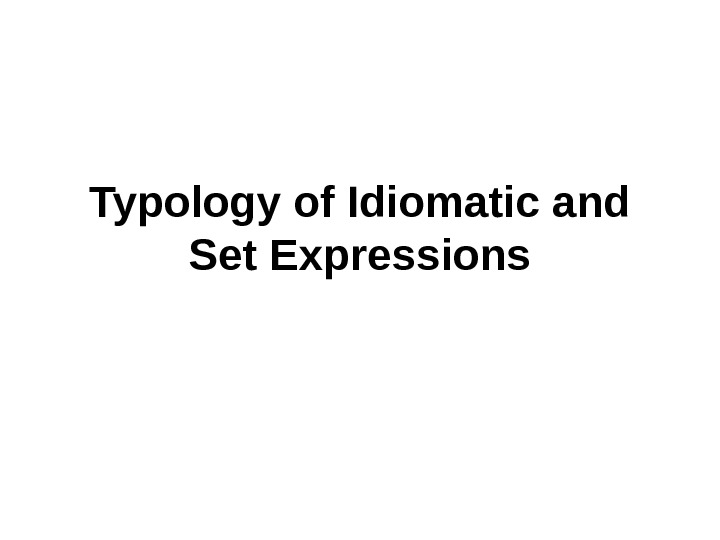
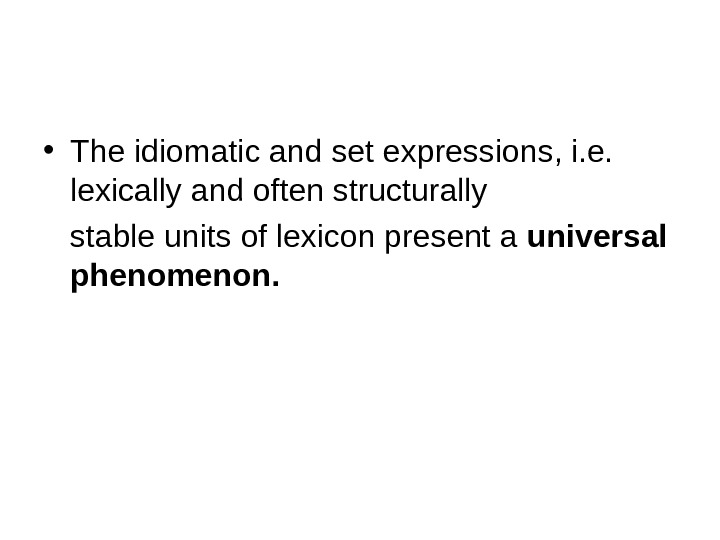
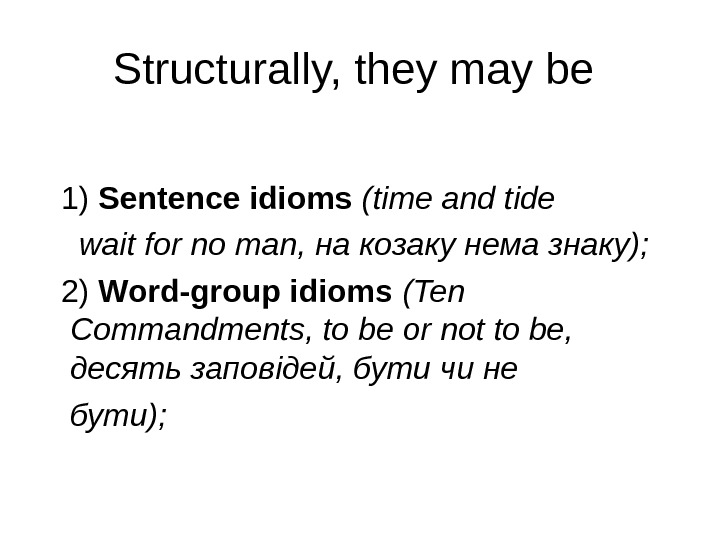
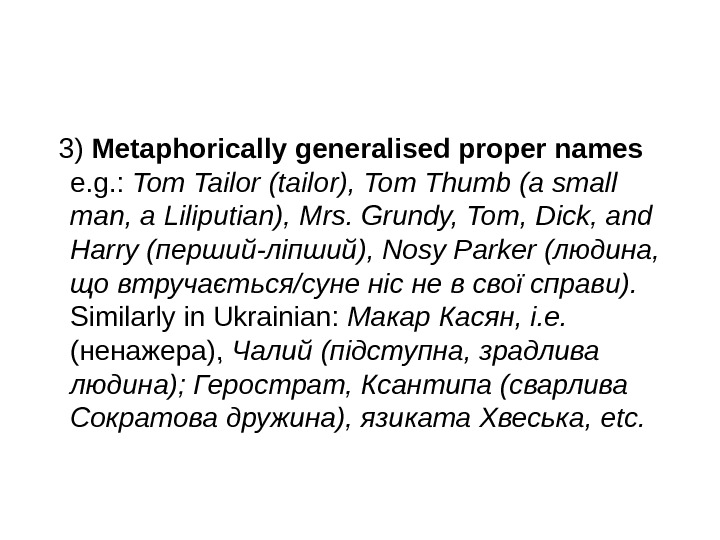
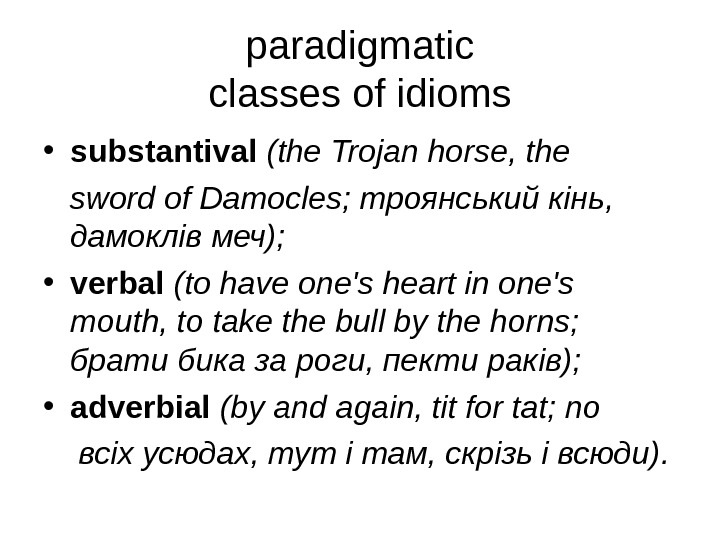
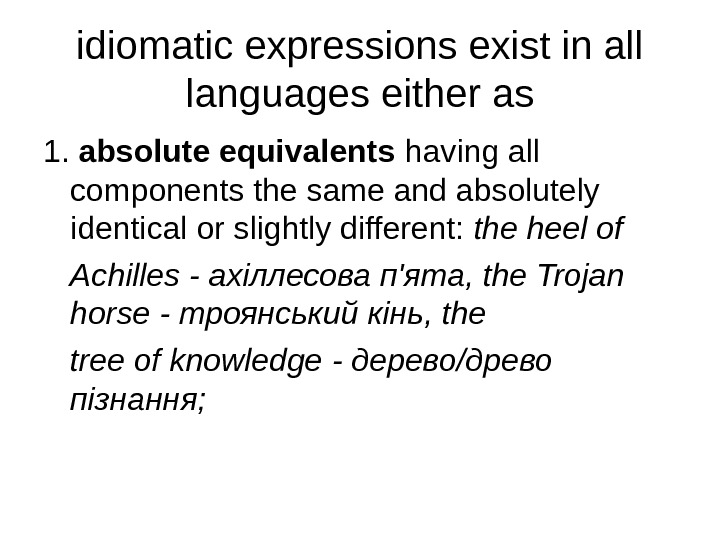
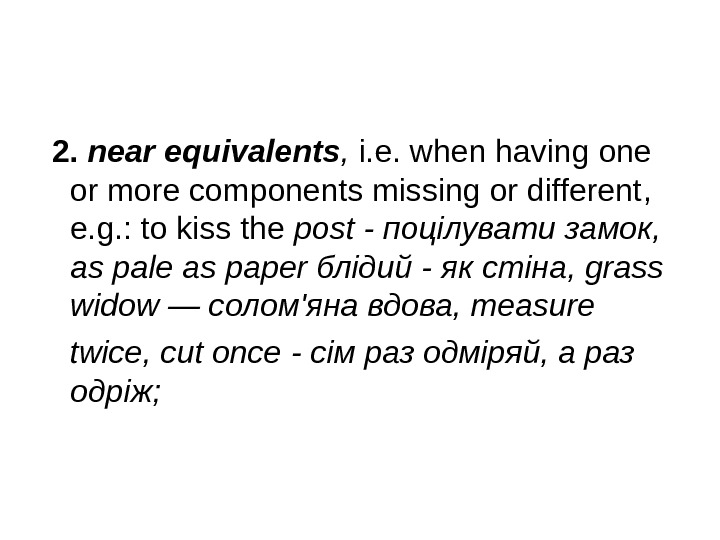
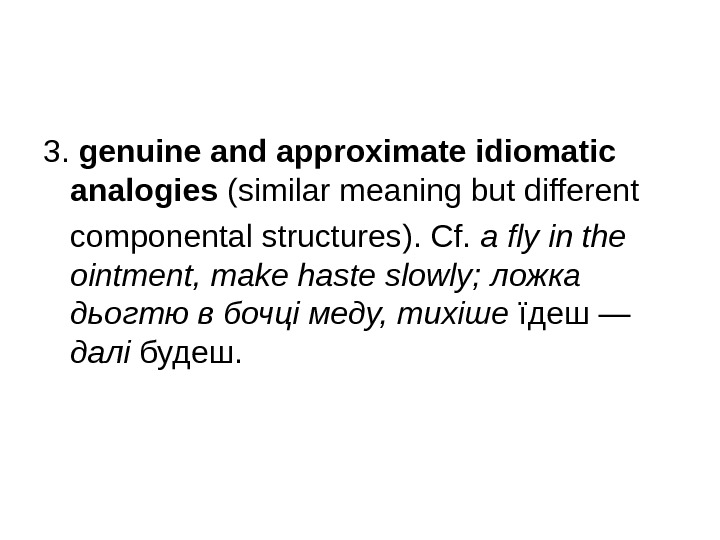
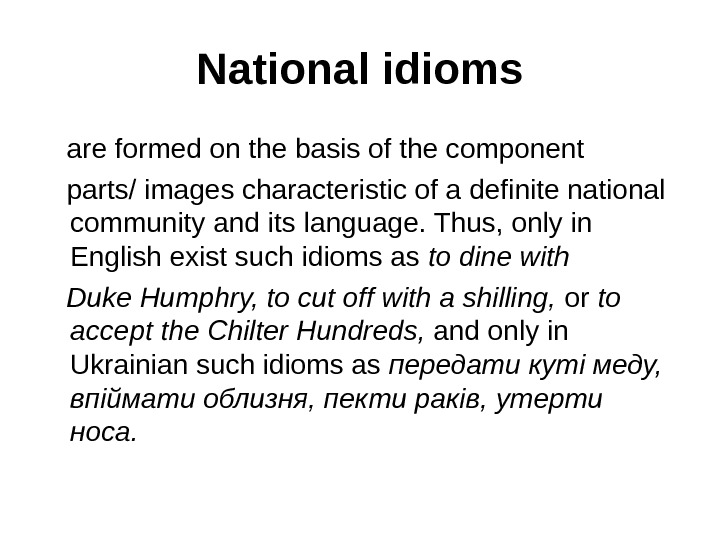
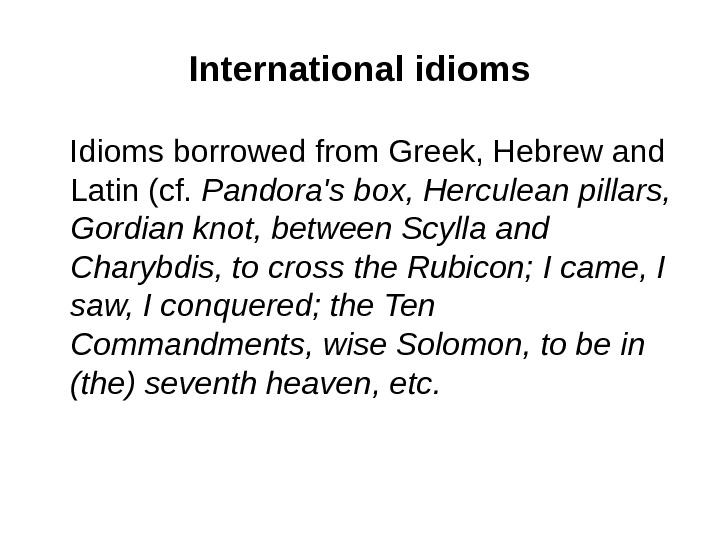
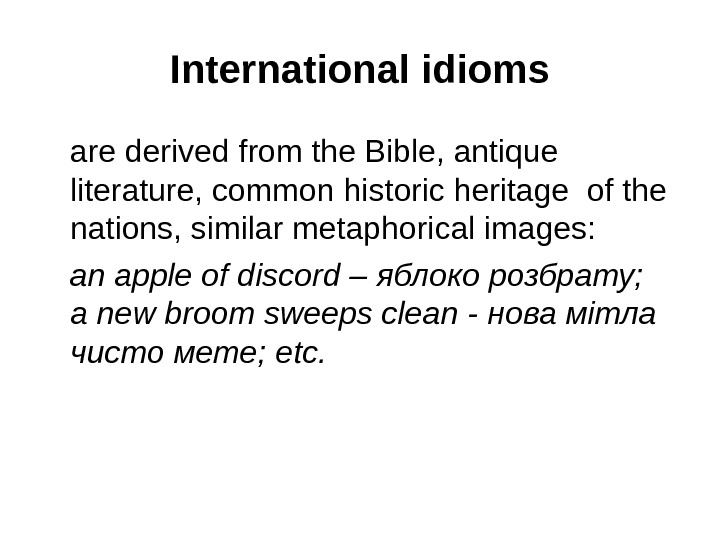
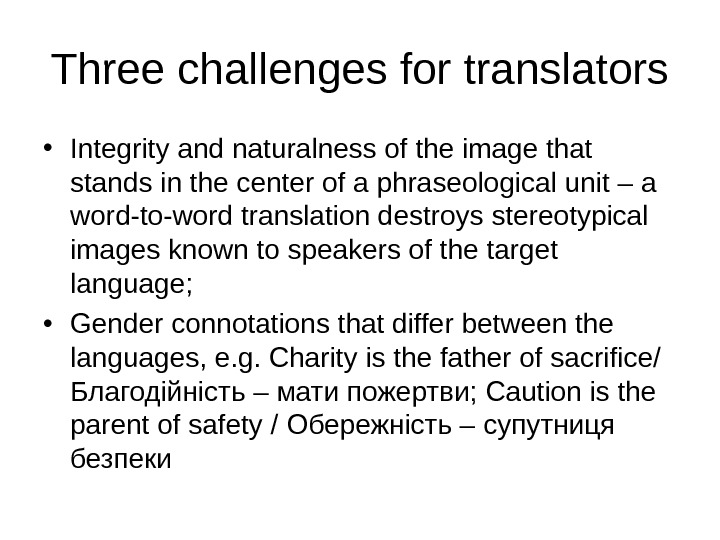
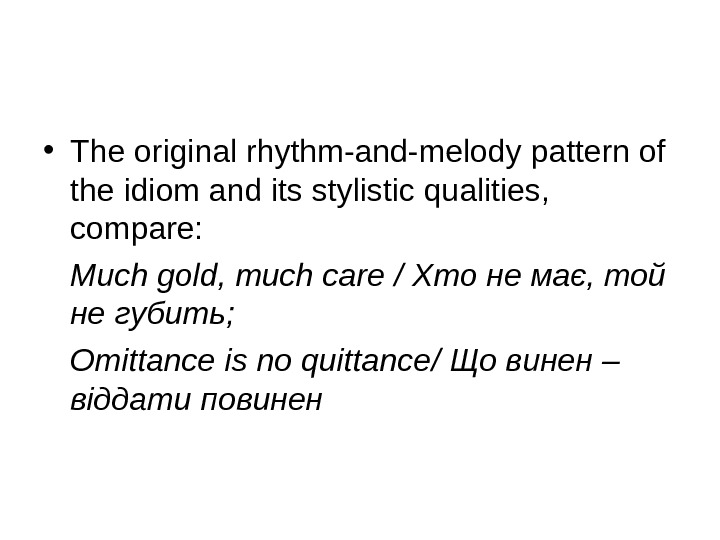
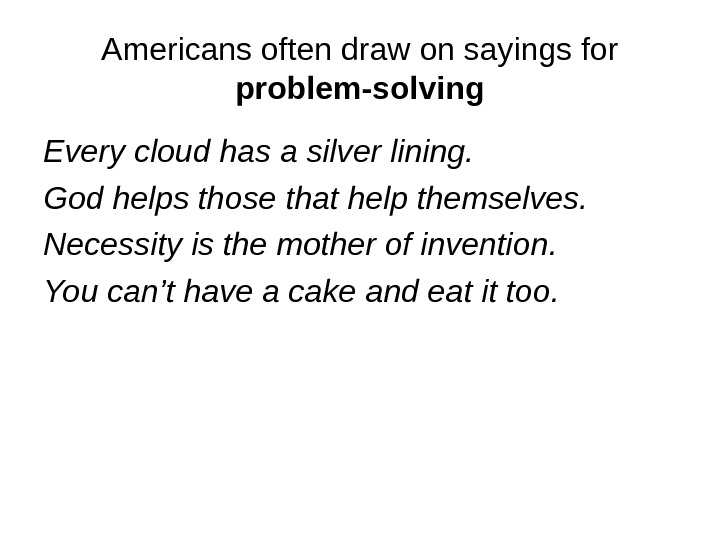

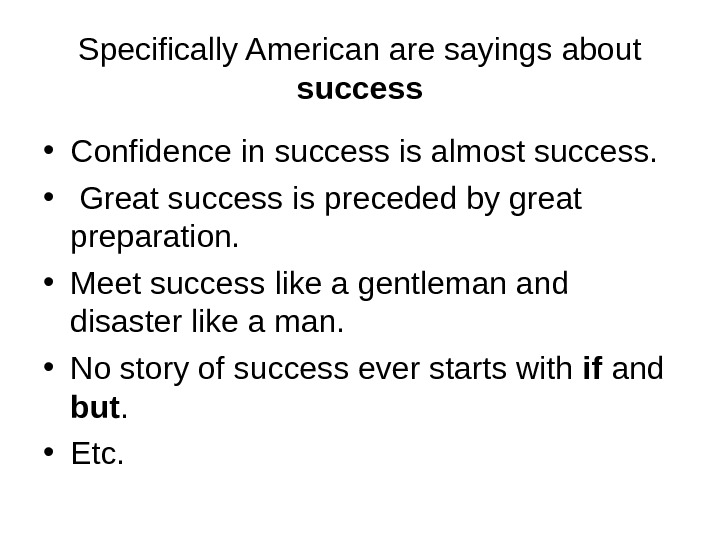
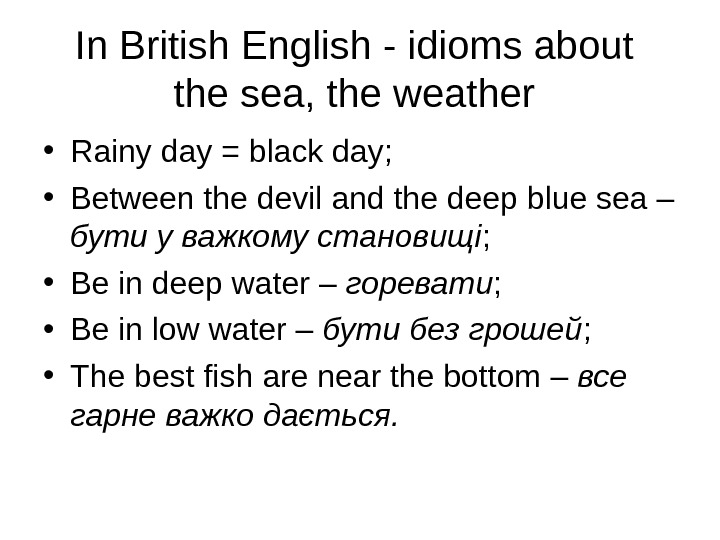
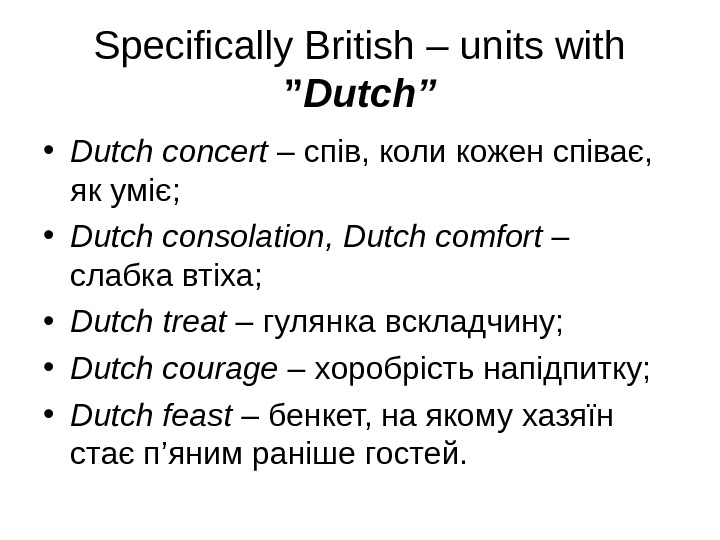
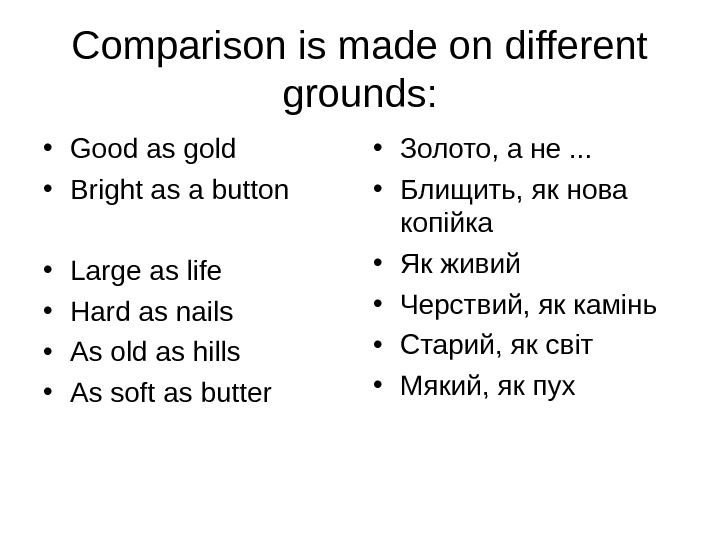
typology_of_idiomatic_and_set_expressions.ppt
- Размер: 90 Кб
- Количество слайдов: 19
Описание презентации Typology of Idiomatic and Set Expressions по слайдам
 Typology of Idiomatic and Set Expressions
Typology of Idiomatic and Set Expressions
 • The idiomatic and set expressions, i. e. lexically and often structurally stable units of lexicon present a universal phenomenon.
• The idiomatic and set expressions, i. e. lexically and often structurally stable units of lexicon present a universal phenomenon.
 Structurally, they may be 1) Sentence idioms (time and tide wait for no man, на козаку нема знаку); 2) Word-group idioms (Ten Commandments, to be or not to be, десять заповідей, бути чи не бути);
Structurally, they may be 1) Sentence idioms (time and tide wait for no man, на козаку нема знаку); 2) Word-group idioms (Ten Commandments, to be or not to be, десять заповідей, бути чи не бути);
 3) Metaphorically generalised proper names e. g. : Tom Tailor (tailor), Tom Thumb (a small man, a Liliputian), Mrs. Grundy, Tom, Dick, and Harry (перший-ліпший), Nosy Parker (людина, що втручається/суне ніс не в свої справи). Similarly in Ukrainian: Макар Касян, i. e. (ненажера), Чалий (підступна, зрадлива людина); Герострат, Ксантипа (сварлива Сократова дружина), язиката Хвеська, etc.
3) Metaphorically generalised proper names e. g. : Tom Tailor (tailor), Tom Thumb (a small man, a Liliputian), Mrs. Grundy, Tom, Dick, and Harry (перший-ліпший), Nosy Parker (людина, що втручається/суне ніс не в свої справи). Similarly in Ukrainian: Макар Касян, i. e. (ненажера), Чалий (підступна, зрадлива людина); Герострат, Ксантипа (сварлива Сократова дружина), язиката Хвеська, etc.
 paradigmatic classes of idioms • substantival (the Trojan horse, the sword of Damocles; троянський кінь, дамоклів меч); • verbal (to have one’s heart in one’s mouth, to take the bull by the horns; брати бика за роги, пекти раків); • adverbial (by and again, tit for tat; no всіх усюдах, тут і там, скрізь і всюди).
paradigmatic classes of idioms • substantival (the Trojan horse, the sword of Damocles; троянський кінь, дамоклів меч); • verbal (to have one’s heart in one’s mouth, to take the bull by the horns; брати бика за роги, пекти раків); • adverbial (by and again, tit for tat; no всіх усюдах, тут і там, скрізь і всюди).
 idiomatic expressions exist in all languages either as 1. absolute equivalents having all components the same and absolutely identical or slightly different : the heel of Achilles — ахіллесова п’ята, the Trojan horse — троянський кінь, the tree of knowledge — дерево/древо пізнання ;
idiomatic expressions exist in all languages either as 1. absolute equivalents having all components the same and absolutely identical or slightly different : the heel of Achilles — ахіллесова п’ята, the Trojan horse — троянський кінь, the tree of knowledge — дерево/древо пізнання ;
 2. near equivalents , i. e. when having one or more components missing or different , e. g. : to kiss the post — поцілувати замок, as pale as paper блідий — як стіна, grass widow — солом’яна вдова, measure twice, cut once — сім раз одміряй, а раз одріж;
2. near equivalents , i. e. when having one or more components missing or different , e. g. : to kiss the post — поцілувати замок, as pale as paper блідий — як стіна, grass widow — солом’яна вдова, measure twice, cut once — сім раз одміряй, а раз одріж;
 3. genuine and approximate idiomatic analogies ( similar meaning but different componental structures ). Cf. a fly in the ointment, make haste slowly; ложка дьогтю в бочці меду, тихіше їдеш — далі будеш.
3. genuine and approximate idiomatic analogies ( similar meaning but different componental structures ). Cf. a fly in the ointment, make haste slowly; ложка дьогтю в бочці меду, тихіше їдеш — далі будеш.
 National idioms are formed on the basis of the component parts/ images characteristic of a definite national community and its language. Thus, only in English exist such idioms as to dine with Duke Humphry, to cut off with a shilling, or to accept the Chilter Hundreds, and only in Ukrainian such idioms as передати куті меду, впіймати облизня, пекти раків, утерти носа.
National idioms are formed on the basis of the component parts/ images characteristic of a definite national community and its language. Thus, only in English exist such idioms as to dine with Duke Humphry, to cut off with a shilling, or to accept the Chilter Hundreds, and only in Ukrainian such idioms as передати куті меду, впіймати облизня, пекти раків, утерти носа.
 I nternational idioms Idioms borrowed from Greek, Hebrew and Latin (cf. Pandora’s box, Herculean pillars, Gordian knot, between Scylla and Charybdis, to cross the Rubicon; I came, I saw, I conquered; the Ten Commandments, wise Solomon, to be in (the) seventh heaven , etc.
I nternational idioms Idioms borrowed from Greek, Hebrew and Latin (cf. Pandora’s box, Herculean pillars, Gordian knot, between Scylla and Charybdis, to cross the Rubicon; I came, I saw, I conquered; the Ten Commandments, wise Solomon, to be in (the) seventh heaven , etc.
 I nternational idioms are derived from the Bible, antique literature, common historic heritage of the nations, similar metaphorical images: an apple of discord – яблоко розбрату; a new broom sweeps clean — нова мітла чисто мете ; etc.
I nternational idioms are derived from the Bible, antique literature, common historic heritage of the nations, similar metaphorical images: an apple of discord – яблоко розбрату; a new broom sweeps clean — нова мітла чисто мете ; etc.
 Three challenges for translators • Integrity and naturalness of the image that stands in the center of a phraseological unit – a word-to-word translation destroys stereotypical images known to speakers of the target language; • Gender connotations that differ between the languages, e. g. Charity is the father of sacrifice/ Благодійність – мати пожертви; Caution is the parent of safety / Обережність – супутниця безпеки
Three challenges for translators • Integrity and naturalness of the image that stands in the center of a phraseological unit – a word-to-word translation destroys stereotypical images known to speakers of the target language; • Gender connotations that differ between the languages, e. g. Charity is the father of sacrifice/ Благодійність – мати пожертви; Caution is the parent of safety / Обережність – супутниця безпеки
 • The original rhythm-and-melody pattern of the idiom and its stylistic qualities, compare: Much gold, much care / Хто не має, той не губить; Omittance is no quittance / Що винен – віддати повинен
• The original rhythm-and-melody pattern of the idiom and its stylistic qualities, compare: Much gold, much care / Хто не має, той не губить; Omittance is no quittance / Що винен – віддати повинен
 Americans often draw on sayings for problem-solving Every cloud has a silver lining. God helps those that help themselves. Necessity is the mother of invention. You can’t have a cake and eat it too.
Americans often draw on sayings for problem-solving Every cloud has a silver lining. God helps those that help themselves. Necessity is the mother of invention. You can’t have a cake and eat it too.
 Americans often draw on sayings for health care • The best doctors are Dr. Diet, Dr. Quiet, and Dr. Merryman. • Change of scenery makes for health. • God restores health, and the physician gets thanks. • After dinner sit a while, after supper walk a while. • Etc.
Americans often draw on sayings for health care • The best doctors are Dr. Diet, Dr. Quiet, and Dr. Merryman. • Change of scenery makes for health. • God restores health, and the physician gets thanks. • After dinner sit a while, after supper walk a while. • Etc.
 Specifically American are sayings about success • Confidence in success is almost success. • Great success is preceded by great preparation. • Meet success like a gentleman and disaster like a man. • No story of success ever starts with if and but. • Etc.
Specifically American are sayings about success • Confidence in success is almost success. • Great success is preceded by great preparation. • Meet success like a gentleman and disaster like a man. • No story of success ever starts with if and but. • Etc.
 In British English — idioms about the sea, the weather • Rainy day = black day; • Between the devil and the deep blue sea – бути у важкому становищі ; • Be in deep water – горевати ; • Be in low water – бути без грошей ; • The best fish are near the bottom – все гарне важко дається.
In British English — idioms about the sea, the weather • Rainy day = black day; • Between the devil and the deep blue sea – бути у важкому становищі ; • Be in deep water – горевати ; • Be in low water – бути без грошей ; • The best fish are near the bottom – все гарне важко дається.
 Specifically British – units with ” Dutch” • Dutch concert – спів, коли кожен співає, як уміє; • Dutch consolation , Dutch comfort – слабка втіха; • Dutch treat – гулянка вскладчину; • Dutch courage – хоробрість напідпитку; • Dutch feast – бенкет, на якому хазяїн стає п ’ яним раніше гостей.
Specifically British – units with ” Dutch” • Dutch concert – спів, коли кожен співає, як уміє; • Dutch consolation , Dutch comfort – слабка втіха; • Dutch treat – гулянка вскладчину; • Dutch courage – хоробрість напідпитку; • Dutch feast – бенкет, на якому хазяїн стає п ’ яним раніше гостей.
 Comparison is made on different grounds: • Good as gold • Bright as a button • Large as life • Hard as nails • As old as hills • As soft as butter • Золото, а не. . . • Блищить, як нова копійка • Як живий • Черствий, як камінь • Старий, як світ • Мякий, як пух
Comparison is made on different grounds: • Good as gold • Bright as a button • Large as life • Hard as nails • As old as hills • As soft as butter • Золото, а не. . . • Блищить, як нова копійка • Як живий • Черствий, як камінь • Старий, як світ • Мякий, як пух

